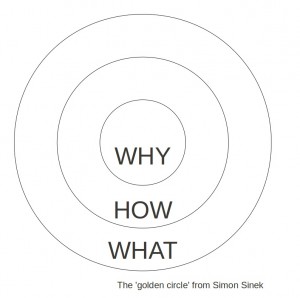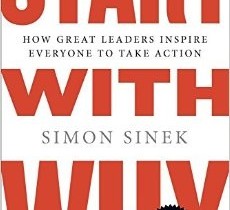Why Values Are The Key To Business Success
Simon Sinek changed the world with his now-famous TED talk How great leaders inspire action. Since this presentation was first shown in September 2009, it has been viewed over 21 million times, and is one of the top ten most-watched presentations on TED.com
 The concepts Sinek talks about in his presentation are presented in great detail in his book, Start with Why
The concepts Sinek talks about in his presentation are presented in great detail in his book, Start with Why. One reason I believe this concept has become so popular is the simplicity of his visual model called The Golden Circle.
The premise is quite straightforward:
- WHY is a core belief.
- HOWs are the actions taken to realize that belief.
- WHATs are the results of those actions.
Note the order: it starts with WHY and works outward to WHAT. It doesn’t work the other way.
Telling others WHAT you do will never motivate action. Simply exampling HOW you do it may intrigue some. But articulating WHY you do what you do is the source of true inspiration.
Great leaders are crystal clear on their WHY. Others follow them because they believe in the same destination – the same outcome – the same WHY. People move away from inertia and into activity if they understand where they are going and the course charted for them.
As Sinek states: people don’t buy WHAT you do, they buy WHY you do it.
WHY vs. HOW and the Importance of Values
So where do values fit into Sinek’s Golden Circle? Note the following points from his book:
- Once you know WHY you do what you do, the question is HOW will you do it?
- HOWs are your values or principles that guide HOW to bring your cause to life.
- Ironically, the most important question with the most elusive answer – WHY do you do what you do? – is actually quite simple and efficient to discover.
- It’s the discipline to never veer from your cause, to hold yourself accountable to HOW you do things, that’s the hardest part.
In other words, determining your WHY is simple (he explains how to do this in the book). But consistently living the values that define your HOW is the hardest part.
Did you catch that? Living your values is the hardest part.
To me, this confirms the importance of investing time and energy in identifying and developing your values. Those that do win. Great leaders find a way to define a few key values that are actionable and inspires everyone to want to adhere to them.
So, identifying and defining values might be the hardest part, but it’s clearly what pays the highest dividends over the long term.
If you find this rather cumbersome, maybe it’s a job for the word nerds….
Nouns vs. Verbs
Sinek also makes the argument that values should be stated as verbs instead of nouns. He feels nouns are not actionable enough. Instead, he feels the best values are verbs.
Looking through the definitions of values from my research of Fortune 500 companies, I think Sinek would be pleased with the following examples:
- Instead of just stating Integrity, Home Depot encourages: “Doing the right thing.”
- Instead of just stating Innovation, Cummins encourages: “Apply the creative ingenuity necessary to make us better, faster, first.”
- Instead of just stating Respect, Delta Air Lines encourages: “Don’t hurt anyone.”
- Instead of just stating Accountability, ConAgra encourages: “Taking responsibility for our parts of the business as though we owned the whole business.”
- Instead of just stating Quality, Coca-Cola claims: “What we do, we do well.”
Of course, to create real competitive advantage, leaders need to go beyond the 17 Common Values. They need to identify and select a few (less than 3) Differentiating Values. Here I was very pleased to read the following statement in Sinek’s book:
“Differentiation happens in WHY and HOW you do it.”
Why do you think living your values is the hardest part?









